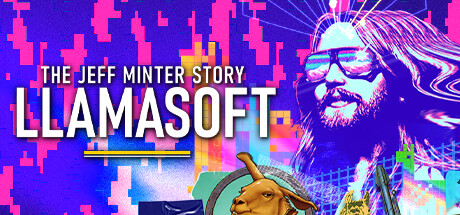Thanks to Digital Eclipse for the review code
Title: Llamasoft: The Jeff Minter Story
System: Steam
Price: $29.99
Release Date: 03/13/2024
Prelude
We’re back with another review of a Digital Eclipse compilation, this one continuing the Gold Master Series established with Karateka many months ago. Last time Jordan Mechner got the spotlight, and now we have scorechaser furry fanatic Yak, AKA Jeff Minter on full focus! Like before, this one mixes a bunch of games in with a lot of historical info, fun facts and documentary video content, so just how does this batch of games tell Jeff’s story?
Presentation
Just like Atari 50 and Karateka, The Jeff Minter Story starts us off in a multi-chapter timeline going over the history of Jeff’s work from the early 80s to the mid 90s, showcasing the games, milestone, and interview videos along the way. By now, you know what to expect if you played either of those two collections, and yet again, everything is presented beautifully here; the timelines are very helpful, packed with lots of concept art/documents/flyers, and each game is emulated well with great border/scaling/filter options. Just like the prior Gold Master Collections, this is one of the rare retro compilations where I didn’t disable the CRT filter.
With that said, there are some interesting tidbits about how certain titles were handled. Some of the very very early games have optional QOL enhancements, mainly to speed them up so you don’t have to wait an eternity for the game to load or complete an action. Yes, back in the early 80s, computers really did take a long time to draw screens. Jumping ahead to the 90s, it should also be noted that the Atari ST titles included here are actually emulated via Jaguar ports; why they don’t use the real Atari ST hardware, I dunno, but I’m guessing it has to do with Bios shenanigans. Either way, the ST games still look and sound great here, though some SEs were altered in Llamatron for legal reasons. Likewise, Atari 50’s post-launch Tempest 2000 overclock setting is included here from the very beginning, so it can run at a lovely 60FPS.
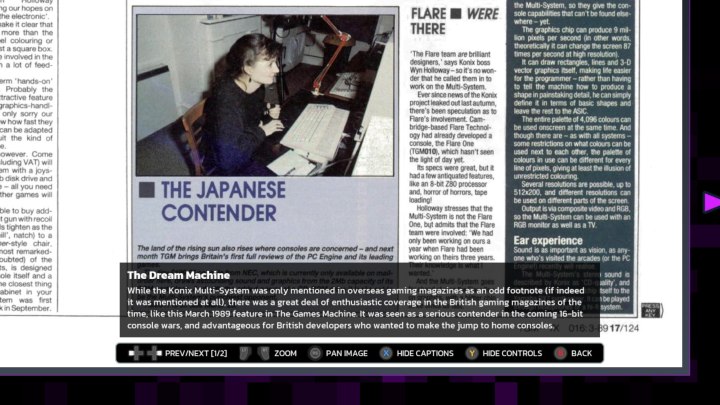
The videos are also well-made, just like last time, although it appears some of the vids are related to an upcoming documentary, as the end of the timeline teases one that’s currently in the works. (separate from Digital Eclipse entirely) The video content is still good and very informative over the steps of Jeff’s dev journey, but it also feels a little bit like a portion of a bigger thing rather than the complete picture (mainly due to this set focusing mainly on pre 2000s stuff; there’s nothing in-depth about recent things like the Nuon or Polybius or Tempest 4000, though one video sums up a lot of that stuff in shorter terms)
Gameplay
This set is a bit odd, since while I normally would cover system by system, or game by game, or year by year to try and group together what’s included here per my usual compilation review methods, The Jeff Minter Story consists of so many games that are pretty scorechaser heavy. Outstanding for a score fanatic like me! But pretty tough to group together like I normally would.
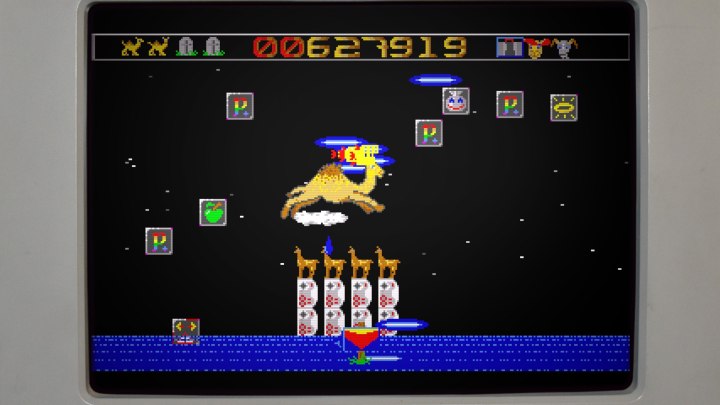
If I grouped by system, the C64 would pretty much take up the majority of this section, since that’s where a lot of Jeff’s hits were, both stuff he made himself for the system, and stuff ported from his older computer projects. Meanwhile, Jaguar is a singular game with Tempest 2000, which is outstanding. Thus, summing up each system would be rather hard.
Game by game? Well we’d be here all day. Thus, I’m gonna mostly just ramble in a few paragraphs about how I feel about the general package, the games we do have (but not all of them), and highlight some favorites that I really love. Of course, I’ll also dedicate a bit of time to the new Remaster of the collection, which focuses on Jeff’s Gridrunner.
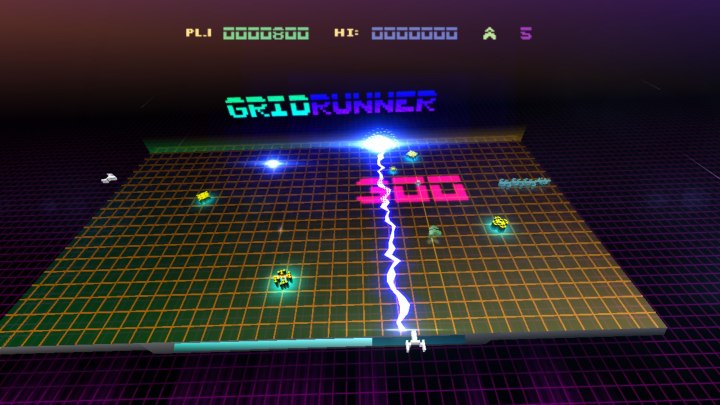
Before I dove into this set, I only previously played Tempest 2000, Tempest 4000, Akka Arrh and Iridus A from Jeff, and I really dug all of those. Iridus A was the first game I jumped into in the collection, and I wasn’t disappointed by how it emulates here. This is a pretty fun, if confusing shmup with a split-screen view, but once you figure out how to survive a bit, it becomes a really good scorechaser to keep trying at again and again, as you make your way farther and farther. It’s very cryptic, but that’s what makes it all the more fun.
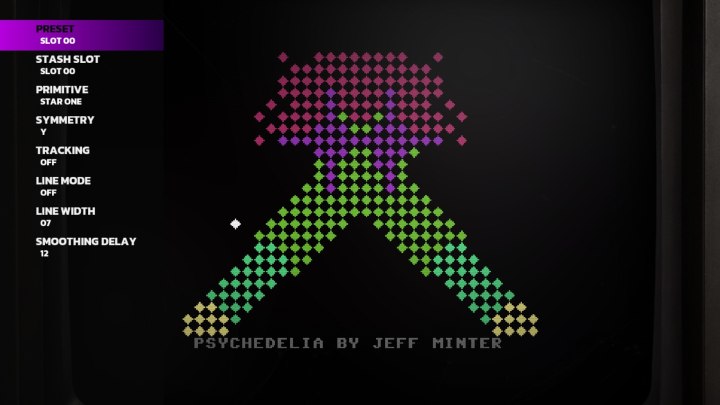
Tempest 2000, I already gushed about in Atari 50, and the exact same applies here. You get the overclock patch from the start this time around. OG framerate or overclocked, this game is bliss and an outstandingly perfect followup to Tempest, with a very, very addicting gameplay loop. You’ll be scorechasing against yourself for a long while if you haven’t already done so recently, and I argue the quality of this game makes the entire collection worth the price of admission. I do wish Tempest 3000 was included somehow, or at least discussed in the timeline more, since it’s the most obscure of the series and Jeff did major work on it.
That being said, we do get a “video game for an obscure system that barely existed except this one was canceled”, in the form of Attack of the Mutant Camels for the Konix Multisystem. Having played the original game here for the first time, it fits in very nicely with Iridus A as an addictive scorechaser where taking risks for more points is the key. The concept is pretty simple, and for a C64 game it gets the job done in typical Yak fashion. However this Konix version really surprised me, since it adds several powerups and bonuses to the mix that are incredibly fun to play around with, so much so to the point I just goofed around with the wide beam for several minutes even though there’s no progression or scoring at all, and you have infinite lives; this was a very early prototype after all, and thus, incomplete. I would have absolutely loved it if DE could have somehow finished the port in its entirety and delivered an expanded 16-bit Mutant Camels experience, since the taste you get here is great.
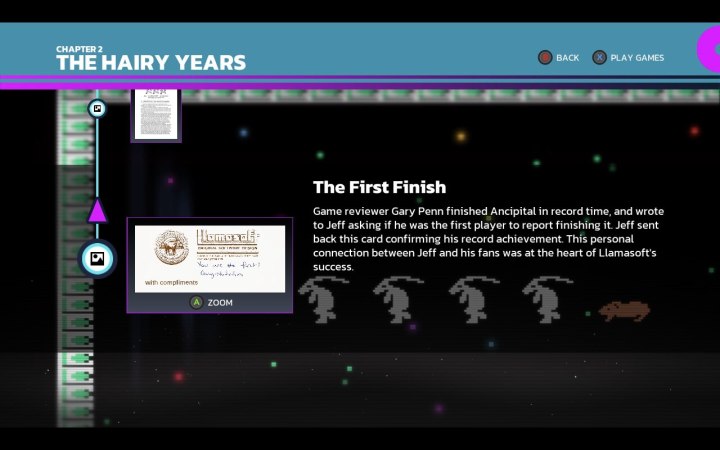
Speaking of C64 gems, there are many, many games in this system category, with my favorite new games being Metallamas and Hover Bovver. Both of these are fun scorechasers with a gimmick that works very well, and are perfect time killers. Metallamas in particular has a very risky scoring system where letting the spiders touch the ground increases their point value, but since you can only shoot diagonally at the walls, actually killing them becomes far more difficult when they’re not hanging from the top of the screen. Very fun game and one I expect to go back to now and again.
The Atari ST stuff is super duper fun too, with Llamatron serving as a really great 16-bit take on am older game. Even as Jaguar ports, they play well and to a newcomer like me I really was fond with both of these scorechasers. Then there’s the super ancient stuff, the Zinclair era, and while none of these really clicked with me and felt more like programming tests more than fleshed out games, I really did enjoy the 3D maze game; with no need to wait for the rooms to draw, navigating and escaping the maze is actually a pretty fun puzzle to try and solve!
Last but certainly not least is Gridrunner Remastered. The original computer versions are here too and are pretty fun takes on a weird centipede-style game, and I found them to be rather decent, if a bit confusing on how to play, with the first version being a bit too slow to ramp up in difficulty for my liking. This remaster on the other hand, based off the C64 version? Yeah, it’s another outstanding job from Mike Mika. It either can be played in a super crisp recreation of that C64 version, or a new, fancier looking enhanced edition that’s just a joy to play, if a bit hard on the eyes at times.
The bigger view and sharper pixels makes this the second best version of Gridrunner in the collection next to the Atari ST one, and the only major thing giving me pause from recommending it more is the fact that you can toggle on an option to play this remaster raw, with no access to rewind or save states whatsoever. Perfect for scorechasing and going after some achievements! However, without the save states, you lose your high score upon closing the game, just like the original C64 version, and I can’t help but feel this toggle in the remaster would have been a lot more fun to use if it wrote the high scores into SRAM or something along those lines. As of now, I just play with the advanced option off solely to save my scores. Still, a good remaster all around.
Conclusion
Ultimately, while I felt the overall lineup put a lot of focus on quantity over quality, I can’t deny that I had a blast discovering some fun obscurities in The Jeff Minter Story. From my old favorite Iridius a, to new favorites like Gridrunner, Attack of the Mutant Camels and Hover Bovver, there are a good few scorechasers worth your time here. Digital Eclipse also did a stellar job with a remaster of Gridrunner, though unfortunately the lack of local score saving for the challenge mode really does damper my mood on that aspect.
As for the other games, they do all play a key part in showing what Jeff was up to, either with his absolutely insane, chaotic Mama Llama game, the cool early days of his 3D maze, and even the super promising, but sadly unfinished Konix version of Attack of the Mutant Camels, among many, many others. As companions to the video content, they’re all fine showcases that do a wonderful job at showing just how a man went from goofing off with Sinclair computers to putting out the outstanding Tempest 2000, but I can’t help but wish this collection went a little bit past that; either by somehow putting Tempest 3000 in, or a smaller modern Yak game like Space Giraffe, this chronology feels like it ends just a little bit too abruptly for my liking.
Still, as a showcase of early UK computing and as a story of one of the earliest independent developers, The Jeff Minter Story excels in telling a fun, if slightly abridged tale while throwing in a ton of fun scorechasers in the process. If you’re a fan of retro UK computers, this is an absolute must-own. For newcomers, Tempest 2000 is pretty much the best game to play here, even if you aren’t a fan of the micom systems. Everything else is just a nice fun bonus to go along with the excellent documentary content, and well worth playing to see what clicks with you, and what doesn’t.
I give Llamasoft: The Jeff Minter Story an 8 out of 10.

